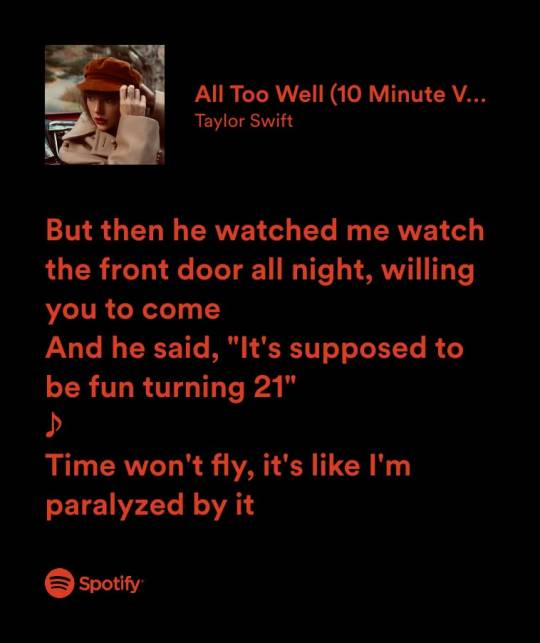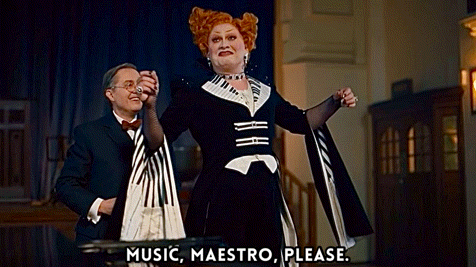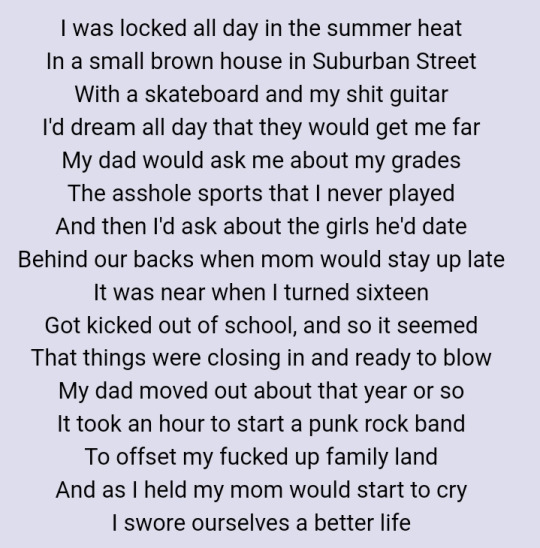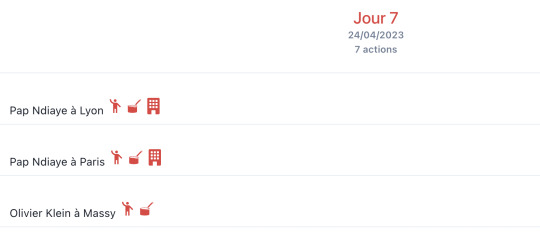#universal music publishing
Text
I know what I like.
No, this is not a phase.
Or a coming of age.
This will never change.
2 notes
·
View notes
Text

Wind in my hair, I was there
Sacred prayer, I was there
It was rare, you remember it all too well
#all too well#10 minute version#taylor swift#liz rose#jack antonoff#spotify#universal music publishing#warner chappell music#from the vault#turned 21 in 2023
1 note
·
View note
Text
Hey. Has anyone noticed that Maestro and Ruby are similarly colour-coded? Black and white stripes. To go with both being musically-oriented and canonically queer for Maestro and pretty sure queer but as yet to be confirmed for Ruby? That's interesting. The way Maestro says Ruby is wrong and keeps looking at her like they're trying to look into her soul... I hope we see Maestro again.


Also, related but not directly, there's been an emphasis on music since the first episode of Fifteenth. Whether intra-diegetically or extra, music has been important for the past 3 episodes, 4 if we start with The Giggle. Between all the musical numbers (I haven't recovered from the goblins yet and now they hit us with the twist?), the Doctor breaking the 4th wall, Maestro themself, Ruby being a musician... It's not new of course, we remember Twelfth and his guitar, or Simm!Master's drums, but it is being put frontstage here. Is it because Murray Gold is back in charge of the music? Is it RTD's season-long narrative arc? There's something going on in regard to music in this series 14...
I wrote an essay last year (in Spanish and I haven't translated it yet otherwise I'd be posting it) comparing Segun Akinola's score with Murray Gold's and how both have their strength and serve their narrative purpose. Basically, Murray Gold's first score for DW (2005-2017) are orchestral compositions, full of easily recognisable leitmotivs and big instrumental scores that make you vibrate with all the instruments, the song itself sometimes being much more known, recognisable and popular than the work it was composed for (see Duel of the Fates and the likes). Meanwhile, Segun Akinola (2018-2022) pertains to the genre of ambient music, much more interested in the tone and the sonorous atmosphere, something that's very popular today (how many playlists on YouTube or Spotify, you know the ones).
Anyway, I'm not going to sum up my entire essay here, but basically the role of music in a cinematic work has changed over the past 20 years, and Doctor Who followed that change, and now with Gold back in the music booth, there's another change appearing, one where one aspect of this change could very well be the importance of lyrical songs. I'd need to research it more closely to be sure, but that's what it looks like at first glance. How interesting!
#doctor who#rapha talks#murray gold#segun akinola#doctor who music#music score#doctor who score#music#i quite like the 4 essays i wrote for my contemporary cinema class last year i should really translate them so i can get them published#the music in dw one is the last one i wrote literally a year sgo (may 13th 2023) and i really like it#i never studied music (alas - i would have loved to) but as a music obsessed person who cannot stand silence i pay a lot of attention#to musical scores in movies and shows and how they work with or against or over the story#and doctor who being my most favourite story in the universe its music means a lot to me#anyway i'm rambling#if someone who knows more about music than i do wants to add/correct/approve something come talk!#rapha is being a whovian
4 notes
·
View notes
Note
May I ask you, because I never really listened to AVA except for the first few singles which are still some of my favorite songs, do you know did Tom ever write any songs that could be seen as about Blink or about Mark or Travis?
As far as I know the only one that's explicitly about blink is Start The Machine.

Obviously the emotions that came with the breakup are evident in a lot of songs, especially throughout that first album (starting anew, moving on, finding new purpose, war as a metaphor for a ruined relationship, it's all in there), but Tom always saw AVA as a way to become something more than 'Tom from blink-182' so he doesn't address any of it as openly as Mark does with +44. It's all more concepts and abstractions.
Oh, and Rite of Spring is Tom recapping his entire life up to that point, so it mentions blink too. During the Lifeforms tour in 2021 he actually dedicated it to Mark a few times and used it as a backdrop to talk about their restored friendship, so he clearly associates it with blink and that time in his life.

youtube
Also: listen to AVA. They're really good, I promise.
#i guess suburban kings from tom's solo/demo album in 2015 kinda relates to blink as well but it's in the same vein as rite of spring#i.e. 'i'm from a broken home in the suburbs and i'm gonna start a punk rock band about it!'#tom started AVA and went 'well i'm gonna write about LOVE and HOPE and the UNIVERSE and everything BEAUTIFUL'#whereas mark just kinda published his diary--anger and angst and hurt and bitterness included#but one of them was high on painkillers and the other in the worst mental state of his life so their music definitely reflects that too#thanks for the ask!!
4 notes
·
View notes
Text
«Quimbara» es una canción interpretada por Celia Cruz y Johnny Pacheco. Escrita por el puertorriqueño Junior Cepeda, fue lanzada como el sencillo principal del álbum de estudio de Cruz y Pacheco Celia & Johnny (1974).
— Wikipedia
3 notes
·
View notes
Text

Untitled (1966), by Saul Steinberg
#art#ink#sheet music#the new yorker#60s#Ink on sheet music paper 18 x 12 in.#Originally published in The New Yorker on May 6 1967.#music#Yale University Art Gallery; Charles B. Benenson B.A.#musical notation
1 note
·
View note
Text
Aliens Music of The Spears #1 (1994) Timothy Bradstreet & Guy Burwell Cover, 1st Appearance of Damon Eddington
#Aliens #MusicofTheSpears #1 (1994) #TimothyBradstreet & #GuyBurwell Cover, #TimHamilton Pencils, #ChetWilliamson Story, 1st Appearance of #DamonEddington "Music of the Spears, Part 1" Little-known and under-appreciated composer Damon Eddington wants to hatch an Alien egg so he can nurture the Alien in captivity and capture its sounds of hatred and pain for the ultimate concert. SAVE ON SHIPPING COST - NOW AVAILABLE FOR LOCAL PICK UP IN DELTONA, FLORIDA https://www.rarecomicbooks.fashionablewebs.com/Aliens%20Music%20of%20the%20Spears.html#1 #RareComicBooks #KeyComicBooks #DarkHorse #DarkHorseComics #ComicBooks

#Aliens Music of The Spears#1 (1994) Timothy Bradstreet & Guy Burwell Cover#1st Appearance of Damon Eddington#Rare Comic Books#Key Comic Books#DC Comics#DCU#DC#Marvel Comics#MCU#Marvel#Marvel Universe#DC Universe#Dynamite Entertainment#Dark Horse Comic Books#Boom#IDW Publishing#Image Comics#Now Comics
0 notes
Text

[text:
When you listen to artists like @/sza, Bad Bunny, or @/theweeknd, you're giving money to Zionists. Jody Gerson is the Chairman & CEO of Universal Music Publishing Group (@/UMPG) and supports Israel.]
1 note
·
View note
Text
Lanzamiento del Tráiler de la Película Biográfica de Amy Winehouse 'Back to Black'...

View On WordPress
#Amy Winehouse#Back to Black#BIOPIC#Jack O&039;Connell#Marisa Abela#Monumental Pictures#Sam Taylor-Johnson#Sony Music Publishing#Studiocanal#The Amy Winehouse Estate#Universal Music Group
0 notes
Text
River Lea Song Lyrics In English- Adele
River Lea friends if you are Looking River Lea song lyrics then you landed right place so don’t worry relaxed and enjoyed the Adele album all songs lyrics peacefully at one place. You can find and read this lyrics easily in any smartphone and Tablet such as Samsung, Motorola, Sony, Xiaomi, Vivo, Oppo, LG, Huawei, Asus, Lava, Micromax, iTel, Nokia, Oneplus, iphone, HTC and other devices. The Micro…

View On WordPress
#Adele#Kobalt Music Publishing Ltd.#River Lea#River Lea Song#River Lea Song Lyrics#Sony/ATV Music Publishing LLC#Universal Music Publishing Group
0 notes
Text
DRUM ME, STUPID! ☆ p.js

pairing: drummer!jisung x fem!reader
drum me, stupid! synopsis: a story about a college student enjoying her life in school perfectly fine, until one of her friends drags the group along to watch their school's band perform. little did she know that day would be marked as the day her whole world turned upside down because of a particular, nonchalant, and difficult drummer boy. a drummer boy who spilled his entire drink on her brand new outfit at a party and never came back.

genre: college au, social media au (some chapters will be written though!), music band au, slight enemies to lovers, unrequited love (for a bit), whole bunch of fluff, angst, mutual pining, silly humor
warnings: explicit language, college partying, alcohol consumption, A LOT of banter between characters including sexual/kys/death jokes of the sort, reader's kind of an ass (in the beginning), jisung ends up being a lover boy once the "nonchalant" wears off, yeonjun flirts like 24/7, overwhelming feelings that the characters can't handle
author's note: hi! since i've always enjoyed reading smaus and always get writers block with full on stories, i decided to make my own :] please excuse my bad knowledge on any of these majors or experiences and none of this reflects the real lives of the kpop idols! this was written solely for entertainment and fun! enjoy!!<3
comment if you wish to be tagged for the story's updates!

profiles #1 ☆ profiles #2
chapters will be added once they're posted!
episode 1: i did NOT agree to this gc name!
episode 2: costumers of ningcreates?!
episode 3: the universe is out to get me
episode 4: p.y.t (pretty young thing) (written)
episode 5: jisung's a coward, we all say in unison
episode 6: the latte lounge incident (written)
episode 7: hating each other era
episode 8: future uncles and aunt
episode 9: apologies & new beginnings
episode 10: what a lover boy!
episode 11: love like the movies (written)
episode 12: super obvious, but still not a confession
episode 13: my wonderwall, at least i hope so (written)
episode 14: she's going ghost mode on me
episode 15: ain't no way a girl got you like this
episode 16: i missed you
episode 17: i missed you (too) (written)
episode 18: finally mine!
episode 19: ningcreates (expanded) fan club
episode 20: she fr got him liking musicals
episode 21: drummer's girlfriend duties
episode 22: i fear yeonjun's loyalty to latte lounge finally paid off
episode 23: first mistake: letting y/n out of your sight wtf
episode 24: you maam caller
episode 25: wym drummer boy has a driver's license??
episode 26: only losers make wishes at 11:11
episode 27: pussy boy stand up
episode 28: no girls allowed at rockway rehearsals! (written)
episode 29: crashed ynsung's date lol
episode 30: ning bag that shit
episode 31: drummed her stupid!
END! started: 06.23.24 finished: 09.03.24

BONUS CHAPTERS:
#1: close to you (written) tba. . .
#2: the not-so-silly apple or orange juice debate tba. . .
#3: finally meeting the parents? tba. . .

© JIRSUNGS. ANY TRANSLATIONS/REPOSTS/PUBLISHES OF MY WORKS ON ANY PLATFORM ARE STRICTLY PROHIBITED! ALL COMMENTS, REBLOGS, LIKES, & FEEDBACK ARE GREATLY APPRECIATED! THANK YOU SO MUCH! I LOVE YOU, MWA! <3
#nct dream texts#kpop texts#nct dream smau#nct smau#park jisung smau#jisung smau#park jisung texts#jisung texts#fic: drum me stupid#nct dream imagines#nct imagines#kpop smau#nct dream fluff#park jisung angst#nct dream x reader#park jisung x reader#nct jisung#nct texts#nct dream scenarios#nct 127 texts#kpop imagines#nct dream fake texts#park jisung x female reader#park jisung fake texts#park jisung imagines#nct dream x female reader#nct dream#park jisung fluff#nct fluff#nct scenarios
1K notes
·
View notes
Text
I don't wanna be your friend, I wanna kiss your lips (ooh-ooh-ooh).
I wanna kiss you until I lose my breath.
I don't wanna be your friend, I wanna kiss your lips (ooh-ooh-ooh).
I wanna kiss you until I lose my breath.
#Spotify#i wanna be your girlfriend#girl in red#Marie Ulven Ringheim#world in red#Universal Music Publishing#Alternativa
3 notes
·
View notes
Text
Unlocking the Secrets of Sync Licensing: A Beginner's Guide to Placing Your Music in Film and Television
Sync licensing is the process of obtaining permission to use a piece of music in a visual media production, such as a film, television show, video game, or commercial. When a music composition is synced with a visual element, it enhances the overall viewing experience and can add to the emotion of the scene.
(more…) “”

View On WordPress
0 notes
Text
MIT libraries are thriving without Elsevier

I'm coming to BURNING MAN! On TUESDAY (Aug 27) at 1PM, I'm giving a talk called "DISENSHITTIFY OR DIE!" at PALENQUE NORTE (7&E). On WEDNESDAY (Aug 28) at NOON, I'm doing a "Talking Caterpillar" Q&A at LIMINAL LABS (830&C).

Once you learn about the "collective action problem," you start seeing it everywhere. Democrats – including elected officials – all wanted Biden to step down, but none of them wanted to be the first one to take a firm stand, so for months, his campaign limped on: a collective action problem.
Patent trolls use bullshit patents to shake down small businesses, demanding "license fees" that are high, but much lower than the cost of challenging the patent and getting it revoked. Collectively, it would be much cheaper for all the victims to band together and hire a fancy law firm to invalidate the patent, but individually, it makes sense for them all to pay. A collective action problem:
https://locusmag.com/2013/11/cory-doctorow-collective-action/
Musicians get royally screwed by Spotify. Collectively, it would make sense for all of them to boycott the platform, which would bring it to its knees and either make it pay more or put it out of business. Individually, any musician who pulls out of Spotify disappears from the horizon of most music fans, so they all hang in – a collective action problem:
https://pluralistic.net/2024/06/21/off-the-menu/#universally-loathed
Same goes for the businesses that get fucked out of 30% of their app revenues by Apple and Google's mobile business. Without all those apps, Apple and Google wouldn't have a business, but any single app that pulls out commits commercial suicide, so they all hang in there, paying a 30% vig:
https://pluralistic.net/2024/08/15/private-law/#thirty-percent-vig
That's also the case with Amazon sellers, who get rooked for 45-51 cents out of every dollar in platform junk fees, and whose prize for succeeding despite this is to have their product cloned by Amazon, which underprices them because it doesn't have to pay a 51% rake on every sale. Without third-party sellers there'd be no Amazon, but it's impossible to get millions of sellers to all pull out at once, so the Bezos crime family scoops up half of the ecommerce economy in bullshit fees:
https://pluralistic.net/2023/11/06/attention-rents/#consumer-welfare-queens
This is why one definition of "corruption" is a system with "concentrated gains and diffuse losses." The company that dumps toxic waste in your water supply reaps all the profits of externalizing its waste disposal costs. The people it poisons each bear a fraction of the cost of being poisoned. The environmental criminal has a fat warchest of ill-gotten gains to use to bribe officials and pay fancy lawyers to defend it in court. Its victims are each struggling with the health effects of the crimes, and even without that, they can't possibly match the polluter's resources. Eventually, the polluter spends enough money to convince the Supreme Court to overturn "Chevron deference" and makes it effectively impossible to win the right to clean water and air (or a planet that's not on fire):
https://www.cfr.org/expert-brief/us-supreme-courts-chevron-deference-ruling-will-disrupt-climate-policy
Any time you encounter a shitty, outrageous racket that's stable over long timescales, chances are you're looking at a collective action problem. Certainly, that's the underlying pathology that preserves the scholarly publishing scam, which is one of the most grotesque, wasteful, disgusting frauds in our modern world (and that's saying something, because the field is crowded with many contenders).
Here's how the scholarly publishing scam works: academics do original scholarly research, funded by a mix of private grants, public funding, funding from their universities and other institutions, and private funds. These academics write up their funding and send it to a scholarly journal, usually one that's owned by a small number of firms that formed a scholarly publishing cartel by buying all the smaller publishers in a string of anticompetitive acquisitions. Then, other scholars review the submission, for free. More unpaid scholars do the work of editing the paper. The paper's author is sent a non-negotiable contract that requires them to permanently assign their copyright to the journal, again, for free. Finally, the paper is published, and the institution that paid the researcher to do the original research has to pay again – sometimes tens of thousands of dollars per year! – for the journal in which it appears.
The academic publishing cartel insists that the millions it extracts from academic institutions and the billions it reaps in profit are all in service to serving as neutral, rigorous gatekeepers who ensure that only the best scholarship makes it into print. This is flatly untrue. The "editorial process" the academic publishers take credit for is virtually nonexistent: almost everything they publish is virtually unchanged from the final submission format. They're not even typesetting the paper:
https://link.springer.com/article/10.1007/s00799-018-0234-1
The vetting process for peer-review is a joke. Literally: an Australian academic managed to get his dog appointed to the editorial boards of seven journals:
https://www.atlasobscura.com/articles/olivia-doll-predatory-journals
Far from guarding scientific publishing from scams and nonsense, the major journal publishers have stood up entire divisions devoted to pay-to-publish junk science. Elsevier – the largest scholarly publisher – operated a business unit that offered to publish fake journals full of unreveiwed "advertorial" papers written by pharma companies, packaged to look like a real journal:
https://web.archive.org/web/20090504075453/http://blog.bioethics.net/2009/05/merck-makes-phony-peerreview-journal/
Naturally, academics and their institutions hate this system. Not only is it purely parasitic on their labor, it also serves as a massive brake on scholarly progress, by excluding independent researchers, academics at small institutions, and scholars living in the global south from accessing the work of their peers. The publishers enforce this exclusion without mercy or proportion. Take Diego Gomez, a Colombian Masters candidate who faced eight years in prison for accessing a single paywalled academic paper:
https://www.eff.org/deeplinks/2014/07/colombian-student-faces-prison-charges-sharing-academic-article-online
And of course, there's Aaron Swartz, the young activist and Harvard-affiliated computer scientist who was hounded to death after he accessed – but did not publish – papers from MIT's JSTOR library. Aaron had permission to access these papers, but JSTOR, MIT, and the prosecutors Stephen Heymann and Carmen Ortiz argued that because he used a small computer program to access the papers (rather than clicking on each link by hand) he had committed 13 felonies. They threatened him with more than 30 years in prison, and drew out the proceedings until Aaron was out of funds. Aaron hanged himself in 2013:
https://en.wikipedia.org/wiki/Aaron_Swartz
Academics know all this terrible stuff is going on, but they are trapped in a collective action problem. For an academic to advance in their field, they have to publish, and they have to get their work cited. Academics all try to publish in the big prestige journals – which also come with the highest price-tag for their institutions – because those are the journals other academics read, which means that getting published is top journal increases the likelihood that another academic will find and cite your work.
If academics could all agree to prioritize other journals for reading, then they could also prioritize other journals for submissions. If they could all prioritize other journals for submissions, they could all prioritize other journals for reading. Instead, they all hold one another hostage, through a wicked collective action problem that holds back science, starves their institutions of funding, and puts their colleagues at risk of imprisonment.
Despite this structural barrier, academics have fought tirelessly to escape the event horizon of scholarly publishing's monopoly black hole. They avidly supported "open access" publishers (most notably PLoS), and while these publishers carved out pockets for free-to-access, high quality work, the scholarly publishing cartel struck back with package deals that bundled their predatory "open access" journals in with their traditional journals. Academics had to pay twice for these journals: first, their institutions paid for the package that included them, then the scholars had to pay open access submission fees meant to cover the costs of editing, formatting, etc – all that stuff that basically doesn't exist.
Academics started putting "preprints" of their work on the web, and for a while, it looked like the big preprint archive sites could mount a credible challenge to the scholarly publishing cartel. So the cartel members bought the preprint sites, as when Elsevier bought out SSRN:
https://www.techdirt.com/2016/05/17/disappointing-elsevier-buys-open-access-academic-pre-publisher-ssrn/
Academics were elated in 2011, when Alexandra Elbakyan founded Sci-Hub, a shadow library that aims to make the entire corpus of scholarly work available without barrier, fear or favor:
https://sci-hub.ru/alexandra
Sci-Hub neutralized much of the collective action trap: once an article was available on Sci-Hub, it became much easier for other scholars to locate and cite, which reduced the case for paying for, or publishing in, the cartel's journals:
https://arxiv.org/pdf/2006.14979
The scholarly publishing cartel fought back viciously, suing Elbakyan and Sci-Hub for tens of millions of dollars. Elsevier targeted prepress sites like academia.edu with copyright threats, ordering them to remove scholarly papers that linked to Sci-Hub:
https://svpow.com/2013/12/06/elsevier-is-taking-down-papers-from-academia-edu/
This was extremely (if darkly) funny, because Elsevier's own publications are full of citations to Sci-Hub:
https://eve.gd/2019/08/03/elsevier-threatens-others-for-linking-to-sci-hub-but-does-it-itself/
Meanwhile, scholars kept the pressure up. Tens of thousands of scholars pledged to stop submitting their work to Elsevier:
http://thecostofknowledge.com/
Academics at the very tops of their fields publicly resigned from the editorial board of leading Elsevier journals, and published editorials calling the Elsevier model unethical:
https://www.theguardian.com/science/blog/2012/may/16/system-profit-access-research
And the New Scientist called the racket "indefensible," decrying the it as an industry that made restricting access to knowledge "more profitable than oil":
https://www.newscientist.com/article/mg24032052-900-time-to-break-academic-publishings-stranglehold-on-research/
But the real progress came when academics convinced their institutions, rather than one another, to do something about these predator publishers. First came funders, private and public, who announced that they would only fund open access work:
https://www.nature.com/articles/d41586-018-06178-7
Winning over major funders cleared the way for open access advocates worked both the supply-side and the buy-side. In 2019, the entire University of California system announced it would be cutting all of its Elsevier subscriptions:
https://www.science.org/content/article/university-california-boycotts-publishing-giant-elsevier-over-journal-costs-and-open
Emboldened by the UC system's principled action, MIT followed suit in 2020, announcing that it would no longer send $2m every year to Elsevier:
https://pluralistic.net/2020/06/12/digital-feudalism/#nerdfight
It's been four years since MIT's decision to boycott Elsevier, and things are going great. The open access consortium SPARC just published a stocktaking of MIT libraries without Elsevier:
https://sparcopen.org/our-work/big-deal-knowledge-base/unbundling-profiles/mit-libraries/
How are MIT's academics getting by without Elsevier in the stacks? Just fine. If someone at MIT needs access to an Elsevier paper, they can usually access it by asking the researchers to email it to them, or by downloading it from the researcher's site or a prepress archive. When that fails, there's interlibrary loan, whereby other libraries will send articles to MIT's libraries within a day or two. For more pressing needs, the library buys access to individual papers through an on-demand service.
This is how things were predicted to go. The libraries used their own circulation data and the webservice Unsub to figure out what they were likely to lose by dropping Elsevier – it wasn't much!
https://unsub.org/
The MIT story shows how to break a collective action problem – through collective action! Individual scholarly boycotts did little to hurt Elsevier. Large-scale organized boycotts raised awareness, but Elsevier trundled on. Sci-Hub scared the shit out of Elsevier and raised awareness even further, but Elsevier had untold millions to spend on a campaign of legal terror against Sci-Hub and Elbakyan. But all of that, combined with high-profile defections, made it impossible for the big institutions to ignore the issue, and the funders joined the fight. Once the funders were on-side, the academic institutions could be dragged into the fight, too.
Now, Elsevier – and the cartel – is in serious danger. Automated tools – like the Authors Alliance termination of transfer tool – lets academics get the copyright to their papers back from the big journals so they can make them open access:
https://pluralistic.net/2021/09/26/take-it-back/
Unimaginably vast indices of all scholarly publishing serve as important adjuncts to direct access shadow libraries like Sci-Hub:
https://pluralistic.net/2021/10/28/clintons-ghost/#cornucopia-concordance
Collective action problems are never easy to solve, but they're impossible to address through atomized, individual action. It's only when we act as a collective that we can defeat the corruption – the concentrated gains and diffuse losses – that allow greedy, unscrupulous corporations to steal from us, wreck our lives and even imprison us.

Community voting for SXSW is live! If you wanna hear RIDA QADRI and me talk about how GIG WORKERS can DISENSHITTIFY their jobs with INTEROPERABILITY, VOTE FOR THIS ONE!

If you'd like an essay-formatted version of this post to read or share, here's a link to it on pluralistic.net, my surveillance-free, ad-free, tracker-free blog:
https://pluralistic.net/2024/08/16/the-public-sphere/#not-the-elsevier
#pluralistic#libraries#glam#elsevier#monopolies#antitrust#scams#open access#scholarship#education#lis#oa#publishing#scholarly publishing#sci-hub#preprints#interlibrary loan#aaron swartz#aaronsw#collective action problems
617 notes
·
View notes
Text
Update on the French protests: we've had a well-known expert in contemporary political history call the situation we're in "the worst democracy crisis France has known since [the end of the 4th Republic]" and meanwhile the government is trying its hardest to maintain a façade of normal functioning by a) hiding from protesters, b) hiding protesters from view, and c) banning saucepans and other means of drawing attention to the protests that are being swept under the rug.
I mean casserolades are an old tradition in this country but they wouldn't have been needed if Macron &co hadn't started almost systematically banning protests in entire districts of the towns they visit and setting up police roadblocks to prevent peaceful protesters from going anywhere near them. (Too bad because these are the kinds of images the media get (these 2 are from Le Monde) when protesters get to talk to Macron <3) :


Protesters corralled away where they can be easily ignored started banging pots and pans so the protest could at least be heard in the background of TV footage, and then pans started being confiscated.
French courts have repeatedly struck down the bans as illegal but police prefects keep churning new bans out every time Macron goes somewhere anyway, trying to publish them at the last minute so there's no time for a judicial review. (I saw a sign at a protest last week that went "Stop with all the bans we no longer have time to disobey all of them")
After boldly banning saucepans by calling them "portable sonorous devices" last week, today a police prefecture banned "festive gatherings of a musical nature" in a town Macron will be visiting tomorrow. They're (ab)using counter-terrorist legislation for all this, so these days we get to read unheard-of court rulings that go like "We are suspending this prefectural decree as we do not consider festive gatherings of a musical nature to pose a significant terrorist threat to the President."
If Macron had people showing up in support I don't think we would see so many pissy protest bans because then the media could show backers vs. opponents and things would look normal (and not like 70% of the country is very pissed off with Macron). But there's not much for them to show if they don't show the angry people banging pans and it clearly rankles Macron—we learnt yesterday that he sent a letter to 200,000 political supporters of his essentially ordering them to start making appearances all over the country, to show they are "proud of what you are and of what our country has become [since I got elected]." That seems a bit desperate.
For months Macron &co have been predicting that people would get tired of taking to the streets in large numbers, and now that people are going like—right, let's try a new strategy, small local protests greeting gov members everywhere they go!—we're hearing a clear "no not like that, that's not what we meant :l " reaction from the government.
They've also been trying the strategy of announcing stuff at the last minute, like on Monday the Minister of Education announced at noon that he would visit a higher learning institution in Lyon 2 hours later, and a hundred of protesters still showed up and tried to force their way into the building. They were held off by cops using tear gas and trying to block entrances (there's a pic that made me smile, showing cops trying to barricade university gates with garbage bins—how the tables have turned...!) and the Minister ended up not showing up and moving on to the next step of his schedule (protesters tried to follow him there but police vans were blocking the street.)
The first half of the video is at the uni in Lyon; the second half is in Paris later that day. When he returned to Paris the Minister was greeted by protesters with saucepans at the train station, it's like a national relay race of protesting at times. He had to go back through the train to leave via the other end of the platform under police escort so as not to meet any protesters (god forbid).
Macron commented that this was "uncivic" behaviour and I agree, civic behaviour on the part of gov members would be to at least face the people they choose to fuck over, instead of hiding behind cops and fleeing. Obviously Macron was condemning the 'uncivic' protesters though, and the Minister said he felt "physically threatened" by the "violence of [the protesters'] speech" which is a shit thing to say considering on the same day that he was mildly inconvenienced by having to take a different exit and felt physically endangered by words, yet another protester was mutilated after being shot at by police with a rubber bullet. Not a peep about this incident (or previous ones) from the government. The Minister of Education never even condemned that time high schoolers trying to protest got tear gassed and threatened with riot guns by cops in front of their school earlier this month.
But while people continue protesting despite the actual violence from cops, our ministers are looking pretty scared of citizens banging pots and pans. Here's a list of official visits that got cancelled "for safety reasons" (saucepan terrorism) in the past week:
1. Minister P. NDiaye cancelled a visit in Lyon 2. Minister F. Braun cancelled a visit to Evrard Hospital 3. Minister Delegate O. Klein cancelled a visit in Bobigny 4. Minister Delegate O. Grégoire cancelled a visit in La Baule 5. Minister S. Guerini cancelled a visit in Castelnau 6. Secretary of State B. Couillard cancelled a visit in Rochefort 7. Minister S. Retailleau cancelled a visit to the Paris Saclay University (electricity trade unionists cut the power in the building she was supposed to inaugurate, so) 8. Minister C. Grandjean cancelled a visit in Toulouse (this article says it was probably because the visit was quite near a big highway protest where protesters among other things were building a concrete wall on a national road)

In the same bullshitting vein as "portable sonorous devices", gov spokespeople have been insisting that visits aren't being cancelled, ministers are just "adjusting the course of their trips" which is funny to me. I guess we never beheaded any royalty we just adjusted the course of their necks. I also read a newspaper article that made me laugh, that went like "Minister cancels visit; trade unions disappointed" and I thought it was because the cancelled visit was a meeting with the unions which they wouldn't get to have, but the article said it was actually because they had a good protest planned and wouldn't get to hold it...
Watching protesters mess with the government in small ways on a daily basis has been good for morale—on Twitter the hashtags #IntervillesMacron and #IntervillesduZbeul popped up (zbeul = chaos, mess, and Intervilles was a TV game show that aired for over 50 years, where French cities competed against one another in goofy challenges). I only mentioned cancellations above, but fun things also happen on non-cancelled government visits, like a Minister having to leave a building via the emergency exit because of protesters blocking the building entrance (which some people argued is worth more points than a cancellation as it's more entertaining):

Various websites were created to keep track of all these smaller protests and to officialise the point system that ranks cities on their efforts to fuck with the government:

(the first symbol means a protest, the second means a casserolade, the last one means protesters managed to get inside a building where a visit was taking place)

(Translation:
Ruckus (saucepans, heckling...) 1pt
Protest: 1pt
Creative action (chasing minister in the woods, etc): 2pts
Measures of energy conservation (= power cuts by unions) 3pts
Action that leads to a political figure fleeing: 4pts
Cancellation of a visit: 5pts
— then there's a weighting system where the score is multiplied by 3 if it's a Minister, by 5 if it's the Prime Minister, by 6 if it's Macron.) (I also saw an interesting debate on Twitter this week—since our leaders often embarrass themselves, how should the government's own goals fit into the point system?)
Right now the Hérault department is winning because on top of protests, power cuts and casserolades, protesters greeted Macron with a giant "MACRON FUCK OFF" sign hung from a cliff (!) and took over a highway display so it'd say "Welcome to [region] Butthole Ist"

These past few days I've been discovering unknown French cities (and Ministers) thanks to them showing up in the hashtag after a good protest. I discovered a mediaeval castle I'd never heard of when unions hung banners featuring our most famous revolutionary dates from the castle's battlements. (Two days later, another protest with eloquent banners in the Musée d'Orsay in Paris:)


People are very creative—last week we heard that protesters got prosecuted for giving Macron the finger and insulting him during one of his official visits (< we are a healthy democracy), so protesters in another region tried a more sarcastic approach, and greeted a deputy from Macron's party at a strawberry fair this week with clapping and confetti and "Thank you for making us work 2 more years, thank you for police repression, thank you!" The deputy beat a hasty retreat. Then said he would file a complaint against the harassment and intimidation he had been subjected to. (The tear gas and riot guns and arrests and protest bans are not intimidation of protesters on the other hand. Or the fact that another deputy from his party recently said on TV that they were "ready for war"... They're ready to wage war, but run and hide when people clang saucepans and throw confetti.)
Anyway. I'm enjoying the fact that they can't even attend a small strawberry fair without getting heckled right now. In one of my first posts about the political crisis in March I wrote something like "How will Macron and his gov have any legitimacy to speak about any issues after this?" and it cheers me up to see a lot of people across the country agree that they have no legitimacy to talk about anything, not even the strawberry harvest.
The next nationwide protest is of course for May 1st, but in the meantime it's been really fun following the smaller protest actions all over the place. Members of government & Macron's party keep making whiny statements along the lines of this is terrorist behaviour, we can't go anywhere, why are people not getting tired of fucking with us and the answer is, because it's really entertaining!
This was the last sentence of a recent Le Monde article about Macron's situation and it has such a sinister, end-of-reign tone:

"I'm moving forward," Macron concluded, on April 20th in the Herault department, while behind his back echoed the sound of saucepans.
#frpol#well this is another very long post and it features maybe 40% of all the shit from the past week#like there was another popular hashtag last week that went ''no retraction [of the reform] no olympic games''#and the police prefect of Paris said ''the closer we get to the Olympics the more we will saturate public space with police''#okay! good atmosphere so far
5K notes
·
View notes
Text
Here's your daily reminder that...
Jews are only 0.2% of the worlds population but...
Jews make up 14% of the World Total and 38% of the United States of America total winners for the Nobel Prize for Literature (source).
Of the 965 individual recipients of the Nobel Prize and the Nobel Memorial Prize in Economic Sciences between 1901 and 2023, at least 214 have been Jews or people with at least one Jewish parent, representing 22% of all recipients. (source)
Jews make up 14% of the total winners of the Pulitzer Prize for Fiction 18% of the total winners of the Pulitzer Prize for Poetry; 53% of the total winners of the Pulitzer Prize for Non-Fiction (source).
Jews make up 39% of the total winners of the Antoinette Perry (Tony) Award for Best Play; 54% of the total winners of the Tony Award for Best Book of a Musical (with 62% of all Composers and 66% of all Lyricists of Best Musical-winning productions being Jewish) (source).
Jews make up 40% of the total winners of the Academy Award (Oscar) for Best Original Screenplay; and 34% of the total winners of the Academy Award for Best Adapted Screenplay (source).
Although Jews constitute only 3% of the U.S. population...
80% of the nation’s professional comedians are Jewish (source).
90% of American comic book creators are jewish (source)
38% of the recipients of the United States National Medal of Science are Jewish (Source).
Jews are very successful, with educational levels higher than all other U.S. ethnic groups with the exception of Asian Americans, and income levels the highest of all groups. Six out of ten Jewish adults have college degrees, and 41% of Jewish families report a household income of $75,000 or more” (source)
Jews are a minority across the globe. We've been historically opressed and hated. But these key figures from history are all Jewish and loved, yet many don't even know they're jewish (or they don't know these people in the first place!):
Stan Lee (birth name: Stanley Martin Lieber) - An American comic book writer and editor, Former executive vice president and publisher of marvel Comics, creator of iron-man, spider-man, and more.
Albert Einstein - a Theoretical physicist, Received the 1921 Nobel Prize in Physics, developed the theory of relativity and the "worlds most famous equation" (E = mc^2), and more.
Ruth Bader Ginsburg - Former Associate Justice of the Supreme Court of the United States, co-authored the initial law school casebook on sex discrimination, co-founded the Women’s Rights Project at the ACLU in 1972, and more.
Jack Kirby (birth name: Jacob Kurtzberg) - an American comic book artist, co-creator of Captain America, one of the most influential comic book artists
Harry Houdini (birth name: Erich Weisz) - a Hungarian-American escape artist, illusionist, and stunt performer, noted for his escape acts.
Emma Lazarus - An American author remembered for her sonnet "The New Colossus," Inspired by The Statue of Liberty and inscribed on its pedestal as of 1903.
Julius Rosenthal, Lillian Wald, Rabbi Emil G. Hirsch, Stephen Wise, and Henry Moskowitz - Jewish activists that helped form the NAACP along with W.E.B. Dubois, Ida B. Wells-Barnett, and Mary Church Terrell.
Mark Zuckerberg - Founder and CEO of Meta, a businessman who co-founded the social media service Facebook, and within four years became the world’s youngest self-made billionaire Harvard alumni.
Joseph Pulitzer - a politician and newspaper publisher, his endowment to the Columbia University established the Pulitzer Prizes in 1917, he founded the Columbia School of Journalism which opened in 1912.
Jacob William Davis - a Latvian tailor who is credited with inventing modern jeans and who worked with Levi Strauss to patent and mass-produce them, died.
Irving Berlin - drafted at age 30 to write morale-boosting songs for military revues (including “God Bless America”). Many Berlin songs remained popular for decades, including “Puttin’ on the Ritz,” “Cheek to Cheek,” “Anything You Can Do (I Can Do Better),” “There’s No Business Like Show Business,” and two celebrating Christian holidays: “White Christmas” and “Easter Parade.”
Rabbi Abraham Joshua Heschel - received his doctorate in Berlin. He was arrested by the Nazis in 1938, moved to the U.S. in 1940, and became an influential figure in the 1960s, marching with the Rev. Martin Luther King Jr. in Selma, Alabama, and speaking out against the Vietnam War.
Elie Wiesel - Romanian-American writer and professor, holocaust survivor, nobel laureate, political activist. Authored 57 books including Night, a work based on his experiences as a Jewish prisoner in the Auschwitz and Buchenwald concentration camps
Bob Dylan - an icon of folk, rock and protest music, won the Nobel Prize in literature for his complex and poetic lyrics.
J. Robert Oppenheimer - ran the Manhattan Project, considered the "father of the atomic Bomb," presented with the Enrico Fermi Award by President Lyndon Johnson.
Betty Friedan - co-founded the National Organization of Women and became its first president, wrote The Feminine Mystique (1963) and helped spark the second wave of feminism.
Gloria Steinem - one of the most prominent feminists of all time, launched Ms. Magazine and co-founded the National Women’s Political Caucus with Bella Abzug, Shirley Chisholm, Betty Friedan and Myrlie Evers-Williams, widow of Medgar Evers.
Sergey Brin - an American businessman best known for co-founding Google with Larry Page, president of Alphabet Inc.
Judith Heumann - a founder of the disability rights movement, led a 26-day sit-in at a federal building in San Francisco. The protest spurred implementation of Section 504 of the Rehabilitation Act, a precursor to the Americans with Disabilities Act.
Larry Kramer - co-founded Gay Men’s Health Crisis in response to the AIDS epidemic but was soon ousted over his confrontational activism. He went on to help launch a more strident group, ACT UP, and wrote a critically acclaimed play, The Normal Heart, about the early AIDS years in New York City.
Steven Spielberg - released his critically acclaimed epic film Schindler’s List, based on the true story of a German industrialist who saved Jews during the Holocaust. The movie won seven Oscars and led Spielberg to launch the Shoah Foundation at the University of Southern California, which filmed interviews with 52,000 survivors of the Holocaust and genocides in Nanjing and Rwanda.
Calvin Klein - made designer jeans and the infamous ad starring Brooke Shields revolutionized the fashion industry, sold his company to Phillips-Van Heusen (now PVH) for $430 million. Klein was the first designer to win three consecutive Coty Awards for womenswear.
Daveed Diggs - an American actor, rapper, and singer-songwriter. he originated the dual roles of Marquis de Lafayette and Thomas Jefferson in the musical Hamilton, for which he won a 2016 Tony Award for Best Actor in a Featured Role in a Musical. Along with the main cast of Hamilton, he was awarded a Grammy Award for Best Musical Theater Album in the same year.
And so much more. (a pretty decent list is available here)
Not only that, but the following are all Jewish inventions...
The Teddy Bear - made by Morris and Rose Michtom in honor of Theodore "Teddy" Roosevelt.
The Ballpoint Pen - *the first commercially sucessfull ballpoint pen was made by Lazlo Biro, a Hungarian-Jew, and his brother.
Mobile Phones - made by Martin Cooper, nicknamed the "father of the cellphone", and was born in Chicago to Ukrainian Jewish immigrants.
The Barbie - made by Ruth Marianna Handler, born to Polish-Jewish immigrants.
Power Rangers - made by Haim Saban, a Jewish-Egyptian
Video Games - made by Ralph Baer, a German-Jew
Peeps - made by Sam Born, a Russian-Jewish immigrants who came to the United States in 1909.
Cards Against Humanity - created by a group of Jewish boys from the same high school
Many Superheroes including Superman, Ironman, spider-man, batman, and more!
and more! (an illustrated list available here.)
Conclusion: If you're Jewish, be proud. You come from a long line of successful people. No matter what happened to them, Jews persevered, and they strived for sucess. Be proud of your culture, your history, these are your people. You're Jewish.
(feel free to reblog and add more, or just comment and i'll add it!)
Last Updated: June 25, 1:35 AM EST
#funkowrites#jumblr#jewblr#jewish tumblr#israel solidarity#judaism#jewish#antisemitism#stop antisemitism#op is a proud jew#proud to be jewish#jewish joy#jewish positivity#jew#proud jew#we will persevere
479 notes
·
View notes